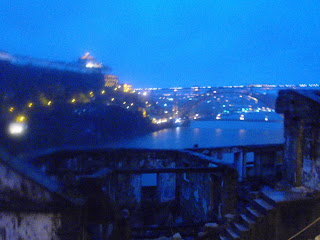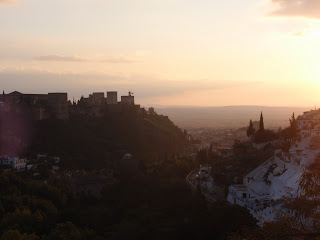Blog Entry #7
My travels in Porto
Spaniards take their holidays seriously. Normally, in the States, if we have a national holiday in the middle of a week, we either have the one day off in the middle of the week, or they extend the weekend by moving the holiday to Monday. In Spain they wouldn't think to do this, instead with a holiday in the middle of the week—like Wednesday December 8the for example1--they extend the weekend prior or after it (in this case prior). They call this a puente or bridge. This weekend then, I took advantage of the puente and took off for the weekend to Porto, Portugal.
The adventure started innocently enough, with of course a delay.2 The gate next to me suddenly told its passengers that their flight had been moved to another gate, and soon they replaced that flight with another. The new flight, just as its passengers were told they were to board, was suddenly cancelled, igniting a series of groans and curses from the crowd. My flight was delayed as we were sitting on the tarmac awaiting clearance. I ended up arriving in Porto two hours late. The next day I came to find out that while I was in the air, every air traffic controller in Spain went on a wildcat strike, shutting down commercial airspace all over the Iberian peninsula.3 The next day, many flights were cancelled, and passengers were stranded all over Spain. The Prime Minister of Spain then declared a national emergency and militarized the airspace above Spain, forcing the air traffic controllers back to work on penalty of martial law. Now, normally, I would be proud of a labor struggle bringing an economy to a halt, but then I learned how much these little fuckers make: the average yearly salary is 200,000 euros, often doubled or tripled through overtime, with some controllers making over 800,000 Pounds.4 I was lucky to get out of Spain, and even luckier to make it to the wonderful city of Porto, which I got to thoroughly explore the next day.
In Porto, I had my first experience with the wonderful couchsurfing.org, a website designed by travelers for travelers, helping strangers connect and find places to stay wherever they may be traveling. Now, I've hosted others before, and informally couchsurfed with friends of mine, but this was my first time traveling with the website, and I was lucky enough to meet and stay with a variety of interesting people. I knew my first host through a CS meet up here in Madrid, and then I was pawned off to another CS-er who lived in a wonderful little apartment overlooking the river and Ponte Luis I.
On Saturday, I got to meet a couchsurfer named Fernando who absolutely floored me. Fernando is a 62 year old short Portuguese man. He's retired, and his children and grandchildren are spread out all over Portugal. He gets to travel the world without leaving the comfort of his own home by hosting and meeting as many visitors to Porto as he humanly can. Fernando has hosted close to 1000 couchsurfers in two years (he was, unfortunately, unable to host me). Fernando loves giving tours of his home town, and the Saturday I met up with him was no exception. Starting early in the morning, Fernando toured me and an Italian traveller named Umberto all around the city, tiring us (youngsters) out! This guy was a machine of walking and talking. I hope I'm as energetic and spry at that age.
The best part about Fernando was the serious of jokes he kept throwing out for conversation pieces. His particular favorite was:
“Porto is a great city for womens drivers, people see them driving, and get out of the way! Empty streets everywhere for the woman driver!” and of course, when one of the females on the tour retorted, “but what happens if there's an accident and a man drives?” Fernando's immortal response: “He was probably thinking of woman...”5
The best joke he had was about souther Portuguese folks: “We're not all perfect, us portuguese. In the south, they so lazy, it take six people for them to make the sex! Two to do it, and four to shake the bed!”
Fernando reminded me of my Dad (I know you're reading this, viejo), and he took us all over the city, including to a free wine tasting tour at a port cellar where they make the world famous port wine (sweet dessert wine). The tour lasted 9 hours without stopping, and I'm really glad I got my ass out of bed early enough to catch it, because I feel like I really got a feel for the city.
Saturday night proved to me how awesome Portugal really is, with bars charging 1 euro for beer, and its not even happy hour! Its definitely a city worth checking out, and I hope that whoever reads this gets the chance to visit someday!
 That's all I have to talk about for now, sorry for the space between posts, but I'd rather write about important things than about mundanities.
That's all I have to talk about for now, sorry for the space between posts, but I'd rather write about important things than about mundanities.1Not sure what the holiday is, some religious crap.
2For those of you unfamiliar with discount travel in Europe, I flew RyanAir---The Ikea of the Skies...except without the, you know, durability or usefulness. They pack you into the plane like sardines, inspect every inch of your luggage to make sure its not too large, and charge you whatever they can for whatever little bullshit service they can charge you. I firmly believe these people are given a quota of passengers they have to fuck over every flight through some absurd technicality.
3http://www.reuters.com/article/idUSLNE6B203720101206
4http://www.timesonline.co.uk/tol/news/world/europe/article6991798.ece
5Not that I condone this kinda joking, but c'mon, its cute! Derivations of this joke were repeated about every half hour...







